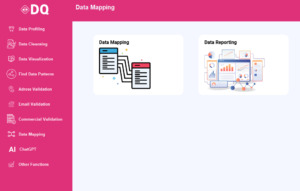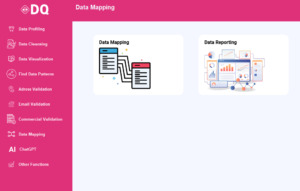Don't wanna be here? Send us removal request.
Text

Data validation is a critical aspect of ensuring the accuracy and integrity of data within various systems and processes. It involves the verification and validation of data to guarantee its reliability and usability. Imagine data validation as the gatekeeper that checks every piece of information trying to enter the system, ensuring only the correct and accurate data gets through. Just like a security checkpoint at an airport, data validation filters out the unwanted and potentially harmful data, allowing only the safe and valid data to pass through.
One of the key challenges in data validation is the sheer volume of data that needs to be processed. With the exponential growth of data in today's digital age, manual validation processes are no longer feasible. This is where automated data validation tools and techniques come into play. These tools streamline the validation process, making it faster, more efficient, and less prone to human error. It's like having a team of tireless workers who meticulously examine every piece of data, ensuring its accuracy and quality without getting tired or making mistakes.
Ensuring data accuracy is not just about maintaining the quality of information but also about upholding the credibility and trustworthiness of the entire system. Inaccurate data can lead to faulty decisions, flawed analysis, and ultimately, disastrous outcomes. Just like a single wrong turn can lead to getting lost in a maze, one incorrect piece of data can derail an entire process or system. Data validation acts as a compass, guiding the system in the right direction by ensuring that the data it relies on is accurate, reliable, and consistent.
Data validation is not a one-time task but an ongoing process that requires continuous monitoring and maintenance. As data evolves and changes over time, so do the validation requirements. Regular data validation checks are essential to identify and rectify any discrepancies, anomalies, or errors in the data. It's like regularly servicing your car to ensure it runs smoothly and efficiently. By proactively validating data on a regular basis, organizations can prevent data quality issues before they escalate into major problems.
0 notes
Text

Data Profiling is a critical aspect of data management that involves analyzing and understanding the structure, content, and relationships within a dataset. By delving deep into the data, organizations can uncover valuable insights and hidden patterns that can significantly impact decision-making processes and overall data quality.
One of the key benefits of data profiling is its ability to identify data anomalies and inconsistencies. Imagine data as pieces of a puzzle scattered across a table. Data profiling acts as the keen-eyed detective that carefully examines each piece, ensuring they fit together perfectly to form a coherent picture. This meticulous scrutiny helps organizations detect errors, duplicates, and outliers that could otherwise go unnoticed.
Moreover, data profiling enables organizations to gain a comprehensive understanding of their data landscape. It's like exploring a vast and uncharted territory, where each discovery sheds light on the intricacies of the data ecosystem. By mapping out data relationships and dependencies, organizations can make informed decisions regarding data integration, migration, and transformation.
With the help of advanced tools like DataQleaner, organizations can streamline the data profiling process and uncover hidden insights more efficiently. DataQleaner acts as a trusted ally in the quest for clean and reliable data, providing automated data profiling capabilities that accelerate the identification of data issues and discrepancies.
By harnessing the power of data profiling tools like DataQleaner, organizations can transform raw data into actionable intelligence, paving the way for improved decision-making, enhanced operational efficiency, and sustainable growth. Embracing data profiling is not just about cleaning up data; it's about unlocking the true potential of data and harnessing its transformative power.
0 notes
Text

AI-based Data Quality is a revolutionary concept that is transforming the way businesses and organizations manage and utilize their data. In today's data-driven world, the quality of data plays a crucial role in the success of any operation or decision-making process. With the rapid increase in data volume and complexity, ensuring data quality has become more challenging than ever before. This is where artificial intelligence comes into play, offering advanced techniques and processes to enhance and maintain high-quality data standards.
Imagine having a powerful ally that continuously monitors, analyzes, and improves the quality of your data without human intervention. That's the power of AI-based data quality solutions like DataQleaner. By leveraging the capabilities of artificial intelligence, DataQleaner can help businesses overcome data challenges by identifying errors, inconsistencies, and anomalies in data sets with unmatched speed and accuracy.
One of the key advantages of AI in data quality is its ability to automate data profiling processes. Data profiling is a critical step in understanding the structure and content of data, as well as identifying any issues that may impact data quality. With AI tools, data profiling tasks can be streamlined and optimized, allowing businesses to uncover hidden insights and trends within their data more efficiently.
Furthermore, AI-based data quality solutions can adapt and learn from data patterns over time, continuously improving their accuracy and efficiency. This adaptive nature of AI enables businesses to stay ahead of data quality challenges and ensure that their decision-making processes are based on reliable and trustworthy data.
With AI-based data quality, businesses can unlock the true potential of their data assets, driving innovation, efficiency, and competitive advantage. By embracing artificial intelligence in data quality management, organizations can pave the way for smarter decision-making, enhanced operational performance, and sustainable growth in the digital age.
0 notes
Text

Data Mapping is a crucial aspect of data validation that plays a significant role in ensuring the accuracy and consistency of data. It involves the process of establishing relationships between different data sets to guarantee that the data is aligned and coherent. By mapping out the connections between various data elements, organizations can identify discrepancies, inconsistencies, and errors within their data, ultimately leading to improved data quality and reliability.
One of the key benefits of data mapping is its ability to facilitate data integration across different systems and platforms. By creating a comprehensive map of how data flows between various sources, organizations can streamline their data management processes and ensure seamless data exchange. This not only enhances operational efficiency but also enables better decision-making based on a unified view of the data.
Moreover, data mapping helps in identifying data dependencies and interrelationships, allowing organizations to understand the impact of changes on different data sets. By visualizing the connections between data elements, businesses can mitigate risks associated with data inconsistencies and ensure data integrity throughout their operations.
When it comes to data validation, DataQleaner emerges as a valuable tool that assists in overcoming the challenges associated with ensuring data accuracy and reliability. By utilizing DataQleaner's advanced capabilities, organizations can streamline their data mapping processes, identify data discrepancies, and establish robust validation mechanisms to maintain high data quality standards.
0 notes
Text

When it comes to managing data, quality is paramount. refers to the accuracy, completeness, consistency, and reliability of data. Ensuring high data quality is essential for making informed decisions, driving business growth, and maintaining operational efficiency. In today's data-driven world, organizations rely heavily on data to gain insights and stay competitive. However, if the data is of poor quality, it can lead to costly mistakes and misinformed strategies.
One of the main challenges organizations face is data inconsistency, where the same piece of information is stored differently across various systems or databases. This can result in confusion, errors, and inefficiencies. DataQleaner is a powerful tool that helps overcome these challenges by providing data cleansing and validation solutions. By using DataQleaner, businesses can streamline their data validation processes, identify and rectify errors, and ensure data accuracy.
Moreover, maintaining high data quality standards is crucial for regulatory compliance and building trust with customers. Inaccurate or incomplete data can lead to compliance issues, fines, and reputational damage. By implementing robust data validation practices, organizations can demonstrate their commitment to data integrity and security.
With DataQleaner, businesses can automate data quality checks, identify duplicate records, validate data formats, and detect anomalies. This not only improves the overall quality of data but also enhances data usability and reliability. By investing in data quality tools like DataQleaner, organizations can unlock the full potential of their data assets and drive better decision-making.
0 notes
Text

Data validation is a crucial process in the realm of data management, ensuring the accuracy, consistency, and reliability of data for various business operations and decision-making processes. By validating data, organizations can identify and rectify errors, inconsistencies, and anomalies within their datasets, ultimately enhancing the overall quality of their data assets. One of the key benefits of data validation is its ability to provide assurance that the data being used is correct and trustworthy, minimizing the risks associated with making decisions based on flawed or incomplete information.
Imagine data validation as the security guard of your data warehouse, meticulously checking each piece of information that enters or exits the premises. Just like how a vigilant guard prevents unauthorized access and maintains order, data validation safeguards the integrity of your data, ensuring that only accurate and reliable information is processed and utilized.
Through the implementation of robust data validation processes, organizations can mitigate the potential risks of data inaccuracies, such as financial losses, compliance violations, and reputational damage. By validating data at various touchpoints, from data entry to data migration, businesses can maintain data consistency and coherence, enabling them to make informed decisions with confidence.
One of the challenges that organizations face in data validation is the sheer volume and complexity of data sources and formats. DataQleaner, a cutting-edge data validation tool, emerges as a valuable ally in overcoming these challenges. With its advanced capabilities and intuitive interface, DataQleaner empowers businesses to streamline their data validation processes, identify discrepancies, and ensure data accuracy with ease.
By leveraging the capabilities of DataQleaner, organizations can navigate the intricacies of data validation more efficiently, saving time and resources while enhancing the overall quality of their data assets. With DataQleaner by their side, businesses can conquer the data validation hurdles and pave the way for accurate, reliable, and actionable data insights that drive success in today's data-driven landscape.
1 note
·
View note